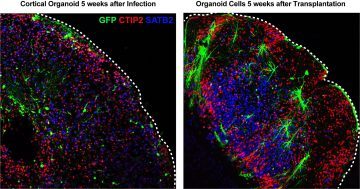From Phys.Org:
 Brain organoids—three-dimensional balls of brain-like tissue grown in the lab, often from human stem cells—have been touted for their potential to let scientists study the formation of the brain’s complex circuitry in controlled laboratory conditions. The discussion surrounding brain organoids has been effusive, with some scientists suggesting they will make it possible to rapidly develop treatments for devastating brain diseases and others warning that organoids may soon attain some form of consciousness. But a new UC San Francisco study offers a more restrained perspective, by showing that widely used organoid models fail to replicate even basic features of brain development and organization, much less the complex circuitry needed to model complex brain diseases or normal cognition.
Brain organoids—three-dimensional balls of brain-like tissue grown in the lab, often from human stem cells—have been touted for their potential to let scientists study the formation of the brain’s complex circuitry in controlled laboratory conditions. The discussion surrounding brain organoids has been effusive, with some scientists suggesting they will make it possible to rapidly develop treatments for devastating brain diseases and others warning that organoids may soon attain some form of consciousness. But a new UC San Francisco study offers a more restrained perspective, by showing that widely used organoid models fail to replicate even basic features of brain development and organization, much less the complex circuitry needed to model complex brain diseases or normal cognition.
“Some people have branded organoids as ‘brains in a dish’ but our data suggest this is a huge exaggeration at this point,” said Arnold Kriegstein, MD, Ph.D., a professor of neurology in the UCSF Weill Institute for Neurosciences, John G. Bowes Distinguished Professor in Stem Cell and Tissue Biology, and director of the UCSF Eli and Edythe Broad Center for Regeneration Medicine and Stem Cell Research, whose lab has been a leader in the development of cerebral organoid models (see prior studies here, here and here.) “We find that organoids do not develop the distinctive cell subtypes or regional circuit organization that characterize normal human brain circuits. Since most human brain diseases are highly specific to particular cell types and circuits in the brain, this presents a grave challenge to efforts to use organoids to accurately model these complex conditions.”
More here.
